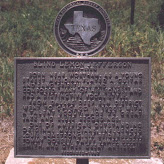Born in September 1893 in a small rural community around Streetman, Texas, near Wortham, about 120 km south east of Dallas, Lemon Henry Jefferson led the classic early life of many country bluesman at that time : learning to play guitar in his teens, playing at picnics, parties and other gatherings, later busking in Dallas, where he met and played with Leadbelly (before he went to jail) in the early 1920s. Though Leadbelly was the elder, he was impressed by BLJ's virtuosity on guitar and later wrote the tribute song "Blind Lemon's Blues". It is almost certain that BLJ traveled to the Mississippi Delta and Memphis, and probably further.
One day in 1925, a Paramount Records talent scout spotted him in Dallas and had him coming to Chicago to record. His first recordings were two gospels, "All I Want Is That Pure Religion" and "I Want To Be Like Jesus In My Heart" (not featured on this Pristine release) under the name Deacon L. J. Bates.
One of the pioneer of the finger-picking ragtime patterns that he brought to a rarely equaled innovative level, an appealing singer with a distinctive high-pitched voice and a talented songwriter alternating sorrowful and humorous lyrics, BLJ became one of the top selling black male recording artists of the late 1920s though life had given him the bad cards from the cradle : poor, blind and black.
At the age of 36 he died in unclear circumstances where reality is again obscured by legend : poisoned by a jealous man or woman, murdered by robbers who would have stolen a big amount of cash just given to him as royalties, frightened to death by a mean dog or struck by a heart attack while he had lost his way in a blizzard… According to his death certificate, at last unearthed by some researcher, BLJ died of "probably acute myocarditis", simply put a cardiac arrest.
Paramount Records paid for the return of his body to Texas by train, accompanied by pianist William Ezell. He was buried in the Wortham "Negro Cemetery" (re-baptized "Blind Lemon Memorial Cemetery" in 2007) in an unmarked grave. In 1967, a Texas historical marker was erected in the general area of his plot (the precise location of the grave is still unknown), and in 1997, a new granite headstone was erected with an inscription reading: "Lord, it's one kind favor I'll ask of you, see that my grave is kept clean."
This finely remastered compilation, though Pristine Audio had to overcome numerous sonic problems due to the awful quality of the Paramount discs and masters, finally manages to present twenty titles among the best recorded by BLJ and the most appropriate to offer a fairly good view of the different facets of his work.
BLJ’s blues guitar style was directly derived from ragtime piano, with a left and right hands piano approach. But despite his extraordinary virtuosity, his unique guitar technique, known for its complex single note runs, is relaxed and never distracted from the melody by unnecessary showy technical tricks. He didn't need to. BLJ is alone singing and playing guitar except on "How Long How Long" where he is accompanied by an unidentified pianist. Could it be this William Ezell who took his corpse to his resting place ?
His songs have later been covered by an army of famous or more obscure blues artists who revered him as being the father of Texas blues and perpetuated this reputation up to the present day.
Any real blues aficionado should have BLJ in his collection, it's an absolute must ! ■
Biographical elements & studies
Covers
 |
| Lou Reed |








No comments:
Post a Comment